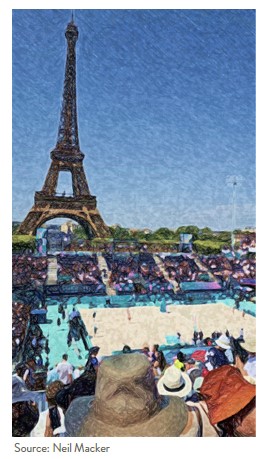In August, I had the pleasure of attending the Summer Olympics in Paris. Over a delightful but very hot week there, a few thoughts popped into my head—observations about the event from someone who spends too much time over-analyzing everything.
The commercialization of sports is nothing new, but the resulting proliferation of sponsorships at the Olympics meant fewer choices at venues. Every drink offered came only from the Coca-Cola family (which was fine with my Coke Zero habit). What’s more, attendees could only pay in cash or with a Visa card. Cards from MasterCard, American Express, UnionPay, or any other credit card network were refused point-blank by vendors at every Olympic venue. Even for online ticket sales, Visa and its logo received prominent placement at checkout. Every other network was relegated to “other cards” status. Visa has long-term deals with the Olympics, so anyone considering the 2028 games in Los Angeles should plan accordingly.

The Olympics also transformed Paris into a demonstration of extensive and not-at-all subtle security measures. Authorities went above and beyond in their attempt to secure the Games and the city from any type of attack with large displays of force, including military planes, helicopters, and drones to patrol the skies. Security cordoned off all the venues for blocks, and the police blocked off many roads, disrupting commuters from across town and the suburbs. While these precautions limited our use of taxis or Uber, the excellent, albeit not air-conditioned, Paris Metro helped us get around town. As we look out to the upcoming Summer Games in LA, the lack of widespread underground public transit could be a tremendous impediment to attendees in a city that already suffers from traffic woes.
While the excitement surrounding the Olympics was palpable around the center of Paris and at official venues across the city, other areas seemed unaffected. Many Parisians simply went about their daily lives. As my travel companions and I wandered around, we were struck that apart from a smattering of Olympic signs, many neighborhoods appeared as they would during a normal Parisian summer. Even finding a place to watch the Olympics while getting a drink was harder than we expected due to the lack of TVs in many bars and cafes – an interesting contrast with the abundance of sports bars across America.
While the lack of TVs was a slight disappointment, the traditional Paris nonchalance towards profit maximization was a welcome respite. In our post-pandemic world, it feels like restaurants and cafes in the U.S. are even more focused on turning over tables than prior to 2020. In Paris, the opposite remains true as the staff would allow customers to linger well after clearing the last plate. Even in busy neighborhoods near Olympic venues, it took much longer for our table to both receive the check and pay than back home – occasionally causing slight panic as we attempted to rush off in time for the next event.